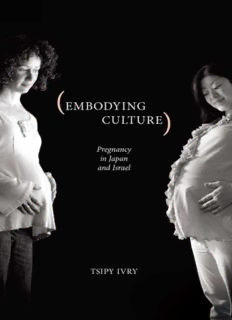
Embodying Culture: Pregnancy in Japan and Israel (Studies in Medical Anthropology) PDF
Preview Embodying Culture: Pregnancy in Japan and Israel (Studies in Medical Anthropology)
Embodying Culture Studies in Medical Anthropology Edited by Mac Marshall Advisory Board William Dressler Sue E. Estroff Peter Guarnaccia Alan Harwood Craig R. Janes Sharon Kaufman Lynn Morgan Catherine Panter-Brick Stacy Leigh Pigg Lorna Rhodes VVVVVVVVVVV Embodying Culture Pregnancy in Japan and Israel TSIPY IVRY VVVVVVVVVVV RUTGERS UNIVERSITY PRESS NEW BRUNSWICK, NEW JERSEY, AND LONDON LIBRARY OF CONGRESS CATALOGING-IN-PUBLICATION DATA Ivry, Tsipy. Embodying culture : pregnancy in Japan and Israel / Tsipy Ivry. p. cm. — (Studies in medical anthropology) Includes bibliographical references and index. ISBN ‒‒‒‒(hardcover : alk. paper) — ISBN ‒‒‒‒ (pbk. : alk. paper) . Pregnancy—Japan. . Pregnancy—Israel. . Pregnant women—Medical care— Japan. . Pregnant women—Medical care—Israel. . Medical anthropology— Japan. . Medical anthropology—Israel. . Japan—Social life and customs. . Israel—Social life and customs. I. Title. GN.JI .(cid:1)—dc A British Cataloging-in-Publication record for this book is available from the British Library. Copyright © by Tsipy Ivry All rights reserved No part of this book may be reproduced or utilized in any form or by any means, electronic or mechanical, or by any information storage and retrieval system, without written permission from the publisher. Please contact Rutgers University Press, Joyce Kilmer Avenue, Piscataway, NJ –. The only exception to this prohibition is “fair use” as defined by U.S. copyright law. Visit our Web site: http://rutgerspress.rutgers.edu Manufactured in the United States of America To Avia, Sarahle, Shlomtsiyon, and Avigail CONTENTS Acknowledgments ix Introduction: Pregnancy, Cultural Comparison, Multisited Ethnographies 1 PART ONE The Doctoring of Pregnancy 1 A Risky Business: Pregnancy in the Eyes of Israeli Ob-Gyns 37 2 The Twofold Structure of Japanese Prenatal Care 77 PART TWO Experiencing Pregnancy 3 The Path of Bonding 123 4 The Path of Ambiguity 185 PART THREE Embodying Culture: Toward an Anthropology of Pregnancy 5 Juxtapositions 231 6 Pregnant with Meaning 257 Notes 265 Bibliography 275 Index 287 vii ACKNOWLEDGMENTS I t is exhilarating to reach the point of writing to express my deep gratitude to all the people who supported and shared with me the pleasures and pains of a project with which I have been pregnant for over a decade. I am deeply grateful to Meira Weiss for introducing me to the magic and wonders of anthropology. I owe an enormous debt of gratitude to Eyal Ben-Ari for his devoted mentoring, support, and invaluable advice throughout the many stages of this project. Very special thanks go to Elly Teman, without whose friendship, loving kindness, and intellectual companionship this book could not have been born. I am grateful to the many anthropology students whose keen and honest questions challenged my thinking and impelled me to sharpen my arguments. Fruitful discussions with my colleagues Nurit Bird-Davis, Carol Kidron, Yoram Carmeli, Asaf Dar, and Yuval Yonai always bring forth fresh ideas. Special thanks are due to Amalia Saar, whose powerful feminist insights, continuous support, and inspiration have contributed immensely to the maturation of this project. Above all I am deeply indebted to the pregnant women and mothers who shared with me some of their most intimate experiences and kindly extended their hospitality. I am deeply grateful to the doctors who found time to discuss their ideas, practices, and concerns with me in the midst of their busy schedules. The women, their partners, doctors, birth educators, laboratory workers, and other care providers remain anonymous to preserve their privacy. I thank my extended family, who supported me in various ways. My mother, Ruth Ivry, never ceased to bring me newspaper articles about pregnancy and women’s health, and my sister-in-law, Ilanit Dado-Lensky, never ceased to pray for the successful completion of this book while lavishing upon me the miracle of her sisterhood. I am especially indebted to Miriam Lensky, my mother-in-law, who, together with Itamar Lensky, took upon herself the full care of our daugh- ters during my field trips to Japan and who has always been ready to step into the breach and lend a hand. She and my mother have been meaningful and enthusiastic partners in raising the girls for the last twelve years. I am grateful to the Truman Institute for the Advancement of Peace for its grants, which made the field trips to Japan possible. As a doctoral student at the ix
Description: